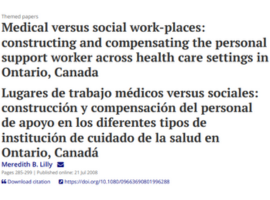Sign Up
Contact Us
We will get back to you as soon as possible.
Please try again later.
Medical Versus Social Work-Places: Constructing and Compensating the Personal Support Worker Across Health Care Settings in Ontario, Canada
This article used the case of personal support work to highlight the extent to which analogous health care services are differentially compensated in the province of Ontario, based on the setting in which care is provided: to the extent that wage differences can be attributed to place alone, home-based workers are the victims of wage discrimination.
Author: Meredith B. Lilly
Publication Date: July 21, 2008
Description: This article explores the role of place in explaining variation in caregiver compensation. Using the labour category of Personal Support Worker (PSW) in Ontario, Canada, it contrasts wage rates across three health care settings: hospitals, long-term care facilities and private homes. An evaluation of current literature from disciplines spanning geography, gender studies, political science and sociology is combined with a critical analysis of policy documents and wage data to reveal that, despite holding similar qualifications and performing comparable job duties, hospital-based workers receive higher wages than home-based workers. I theorize that this wage disparity is partially attributable to the historical privileging of hospital settings in Canada, based on a medical-social continuum of health care valuation. Given that the hospital is constructed as a highly medical place, whereas the home is considered to be a social place, caregiving work enjoys greater financing protection in the former. I argue that these constructions stem from deeply gendered historical roots which view the marketplace as a male-dominated setting for productive waged labour, and the home as a female-dominated setting for unpaid social pursuits. Thus, when personal support services shift from public institutions into private homes, these activities become invisible to the state, and their provision beyond its purview. I conclude that the medical versus social nature of the duties performed by PSWs has become secondary to the medical versus social nature of the setting in which these activities take place. This has translated into lower wages for home-based PSWs, effectively resulting in wage discrimination.
Access: To access this article you will need a subscription
Keywords: home care, public-private, caregiving, labour remuneration, long-term care, Ontario, Canada
Other Research and Reports You May Be Interested In:
Stay Informed
Want updates, news, and announcements about research, innovation, and leading practices in home and community care?
Get Connected. Sign Up Now.
All Rights Reserved | A Division of OCSA



